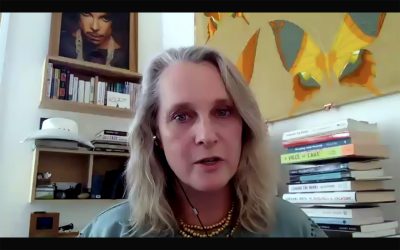After serving 13 months in prison for money laundering, Piper Kerman wrote the memoir “Orange is the New Black: My Year in a Women’s Prison.” Her experience was soon transformed by showrunner Jenji Kohan into a seven-season, Emmy Award-winning Netflix success.

Since the show’s release, Kerman has also been an advocate for justice reform, specifically focusing on the incarceration of women in the United States.
In an event co-sponsored by Boston University’s Law Student Affairs Office, Law Student Government Association, Kilachand Honors College and Center for the Humanities, Kerman spoke about her advocacy, prison reform and how the show reflects these issues.
At the event Monday, Kerman said the long sentences that women, particularly women of color, face in the criminal justice system are creating a larger problem of increased incarceration — Massachusetts has “some of the worst racial disparities in its criminal legal system” in the country, despite having a low incarceration rate.
“The growth of women’s incarceration is really due fundamentally to drug policy, additionally by harsh penalties, so even for more serious crimes, crimes of violence, penalties have grown harsher over recent decades,” she said, “and so that starts to add up to this incredible boom in the incarceration of women.”
Kerman shared stories from her 13 months in prison illustrating how her personal experience greatly differed from those around her.
“There are many people still in the federal system who had crimes extremely similar to mine who received sentences of many decades or even life sentences,” she said at the event. “Overwhelmingly, those people are Black.”
Catherine Devlin, a junior in the College of Arts and Sciences and a part of BU’s Center for the Humanities’ publications and event staff, helped co-create the event. Because of her fascination about the portrayal of cultural or historical concepts in media — such as the prison system in the United States, for example — she said she hoped to host an event based on the film and TV industry.
Devlin said in an interview her favorite part was the event’s interdisciplinary nature.
“I thought it was such a cool demonstration of how different departments and schools at BU have so much overlap,” she said.
Devlin said she also thought Kerman was a good fit because she could speak about the topic from multiple angles.
“We were looking for somebody who could speak to both law perspective as well as more humanities perspective,” she said. “Since she had that overlap of experiencing it and advocating for it in real time, but also having the connections to the TV show, we thought she was a really good fit.”
Dominique McClean, a third-year BU Law student and president of the school’s Student Government Association, helped moderate the event.
McClean said in an interview she had to consider Kerman’s identity and platform before co-sponsoring the event, but decided she was a social justice voice to be heard.
“I’m a Black woman, I’m the president of a SGA at a top-20 law school, and it’s like, OK I feel a responsibility if I’m going to bring a white woman who’s coming to talk about prison abolition, is this somebody who is actually doing the good work?” she said. “And it was a no-hesitation yes.”
McClean said she appreciated how Kerman brought resources and stories to the event about real incarceration, instead of just talking about the show.
“What is more important than the show is that there are real people incarcerated,” she said. “I’m really encouraged that I had an opportunity to be a part of any type of consciousness raising in that sense, especially in this political moment.”
She said she hopes people were “moved to action” after the event and understand the ways in which they can advocate for police reform.
Susan Mizruchi, director of BU’s Center for Humanities and a William Arrowsmith professor in the humanities, was also part of Monday’s discussion. She wrote in an email that Kerman’s concept of prison reform indicates that everyone should be responsible for the current system.
“According to Kerman, we’re all responsible for this terrible situation that we have in this society,” she wrote, “where we have untold numbers of people, unjustly serving long prison sentences for minor drug crimes, and the majority of these people are people of color.”
Carrie Preston, a professor of English and women’s, gender and sexuality studies and director of Kilachand Honors College, said she appreciated how Kerman acknowledged her privilege at the event.
“This happened in the event, and also very much in the memoir, that she puts those concerns forward, front and center, that acknowledgement of her privilege,” she said, “and also the fact that inordinately, women of women of color, women who are survivors of trauma or are experiencing mental disease are incarcerated.”
Preston said around 250 people attended the event, adding that she hopes those attendees learned more about mass incarceration and ways people can engage to find solutions.
“My hope is that the event does both educate and call attention to the crucial issue of mass incarceration,” she said, “and also encourages many in the audience to become active in whatever way they can.”
Lily Kepner contributed to the reporting of this article.



















































































































